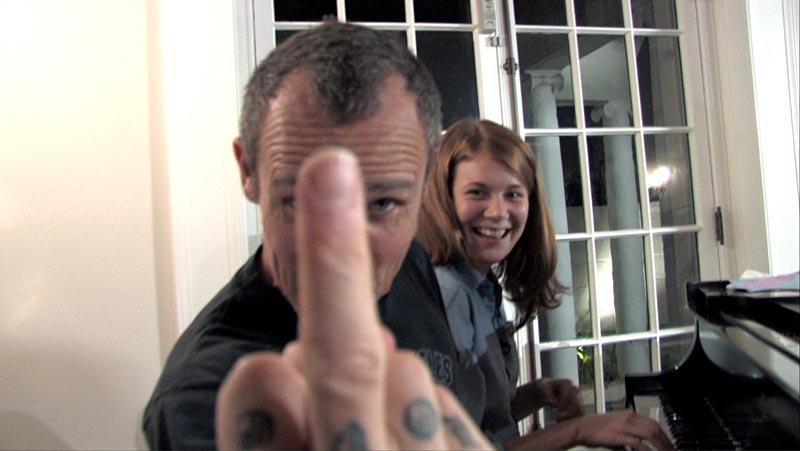To enjoy the severely abridged version of The Way I Am, Eminem’s new scrapbook/memoir, turn to page 122 and behold a lush, full-color, 14-photo collage of America’s finest white rapper giving the finger. Just as Tyra Banks claims to have 275 different ways to smile, Marshall Mathers has developed innumerable genres of bird-flipping: The Street Cred, the Fan Camaraderie, the High on Ecstasy, the Actual Anger, the Terminally Bored, the Badass Autopilot. This last one is most prevalent. Like Kid Rock, the guy employs this gesture so frequently that he now suffers from the Just Don’t Give a Fuck Paradox, wherein you insist that you don’t give a fuck so frequently and ostentatiously that it’s clear you do, in fact, give quite a bit of a fuck.
But projecting a contrite, sympathetic warmth is the ultimate purpose of this immaculately designed coffee-table book. It’s not quite a confession, not quite an apology, not quite a recanting of the various uncouth things he’s done and horrifying things he’s said, but it frequently inches in that direction. And considering Eminem has been more or less silent for more than three years (dealing with a sleeping-pill addiction, at least), the tome’s brew of defiance and redemption greases the skids for a potentially epic comeback, if a comeback is even necessary: In an elaborate, three-month-long, NCAA-style online tournament bracket, Vibe‘s readers recently crowned him Best Rapper Alive. Imagine how high he’d rate if he actually went back to rapping.
To whet your appetite, The Way I Am offers a snappy mix of promo photos, baby pictures, backstage Polaroids, vintage flyers, chicken-scratched lyric sheets, legal documents, and candid personal essays about fame, fatherhood, and regret, rendered in oft-enormous fonts. (It’s not unlike Kurt Cobain’s Journals, except this is voluntary, and Eminem is still alive.) It can all be easily consumed over the course of a lazy, distracted afternoon, but it will make you actually kind of like the guy, and will send you back to his music, which will make you really miss the guy. I myself got hung up on 2001’s “Kill You,” particularly the verse that ends “Blood! Guts! Guns! Cuts! Knives! Lives! Wives! Nuns! Sluts!” Lil Wayne’s funny, sure, but he’s not menacing enough; T.I., vice versa.
To wit, the book’s second sentence is “I have never felt so much pain in my life,” part of an extensive and truly heartbreaking tribute to best friend and D12 cohort Proof, who was shot dead outside a Detroit nightclub in April 2006. From a purely literary perspective, this, right at the onset, is The Way I Am‘s strongest moment, showcasing both Em’s horrified and increasingly disoriented reaction (“I wasn’t making sense when I spoke, so everyone was trying to keep me off TV and away from the press”) and harkening back to the way Proof’s guidance and public support was instrumental to the gawky teenage Marshall Mathers becoming a rapper in the first place (“I’m not going to sugarcoat it—he was my ghetto pass”). What’s more, Proof’s death—in a seedy nightclub along Detroit’s infamously dangerous 8 Mile Road, the sort of place most famous rappers wouldn’t be caught dead—justifies Eminem’s three years of near-complete silence and total seclusion; the other topic this book addresses with complete command is the potentially lethal curse of fame. Thesis: “It’s like, once you’re famous, people feel like they can say anything to you. Like you aren’t even real anymore.”
Most fans won’t need the somewhat meandering personal history lesson—stultifying poverty to stultifying celebrity, basically—that follows, but the visuals ensure you’re never bored regardless. A glamorous shot of a deleted scene from the Oscar-crashing 8 Mile showing Eminem’s character petting a horse is as wonderfully surreal as the scene itself was apparently ridiculous. What’s odd is that his biggest, baddest public antagonists—his twice-over ex-wife, Kim, and allegedly lawsuit-happy mom, Debbie, barely rate passing mentions, but it’s tough to write a literal open book when your entire career has served that purpose metaphorically; Em’s problem is that we already know way too much about him. In a fittingly ludicrous touch, The Way I Am‘s most heartfelt apology comes when he discusses his attempted punchout of Triumph the Insult Comic Dog at the MTV Music Awards, a bizarre calamity he now puts down to paranoia and confusion. “I truly believe that if I were in that situation again, knowing the whole shtick with the puppet dog, I would have acted differently.” Indeed.
If you really, truly can’t live without more prurient mudslinging, have a go at My Son Marshall, My Son Eminem, the recent straight-up memoir by, yes, the guy’s mom, Debbie Nelson. The worst day of her life? The day Marshall married Kim (the first time). Her son’s coming-of-age tale is famously bleak and brutal, but Debbie’s own path is Dickensian in its absurdist awfulness; she’s violently carjacked, blindsided by a breast-cancer scare, and thunderstruck by the suicide of her brother all within 10 pages, with myriad vicious insults and cruel slights from Marshall himself sprinkled in between. Who’s telling the truth and who’s the true villain of that endless familial brawl is way, way beside the point by now; for the record, though, Debbie says the infamous $10 million defamation lawsuit she filed against her son was entirely her lawyer’s idea, and she didn’t even hear about it before Eminem himself did.
The point is we need Eminem again, in all his volatility and vulnerability, and The Way I Am underscores why a comeback is both necessary and very, very dangerous.






